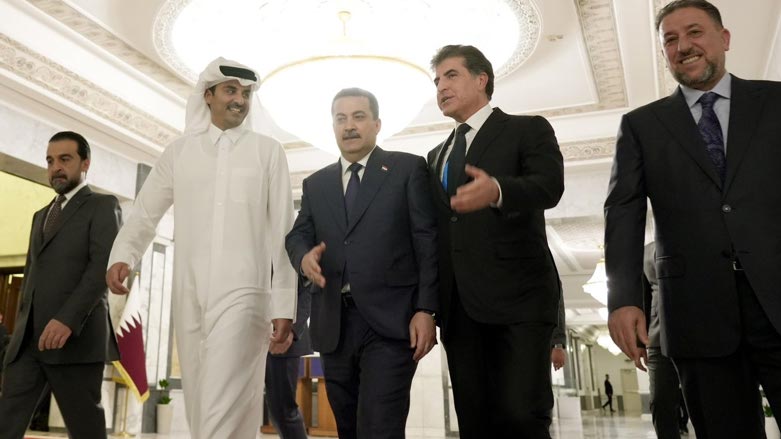White House Welcomes Kurdish President’s Role in Meeting between Qatari Emir and Iraqi Prime Minister

WASHINGTON DC, United States (Kurdistan 24) – The White House welcomed the involvement of the President of the Kurdistan Region, Nechirvan Barzani, in the meeting held on Thursday between the Emir of Qatar and the Iraqi Prime Minister Mohammed Shia’ al-Sudani, along with other senior Iraqi officials.
Read More: Kurdistan President Nechirvan Barzani meets Emir of Qatar in Baghdad
“We welcome the visit of Emir Sheikh Tamim Bin Hamid al-Thani to Baghdad,” National Security Council (NSC) Spokesperson Adam Hodge said in a statement issued late on Friday.
Hodge’s statement suggested that the U.S. seeks to counter Iran’s growing influence in the Middle East by drawing Iraq into closer ties with the Arab states, including the six-member Saudi-led Gulf Cooperation Council (GCC), of which Qatar is a member.
The Kurdistan Region, indeed, has a role to play in such a strategy. The development of ties between the Kurdistan Region and Qatar goes back to 2019, at least, when Qatar’s ambassador to Iraq traveled to Erbil to meet with Masoud Barzani, the long-time Kurdish leader.
Read More: Qatar lauds Kurdistan Region's progress, ready to develop relations: Ambassador
Two years later, Qatar’s Foreign Minister visited Erbil, where more concrete thinking about developing ties emerged, as the Foreign Minister discussed prospects for opening a Qatari consulate in the Kurdistan Region.
Read More: Qatar's FM lands in Kurdistan Region ahead of new Erbil consulate opening
However, it was only last October, just before Mohammed Shia al-Sudani became Iraqi prime minister, that Baghdad approved the establishment of a Qatari consulate in Erbil.
Read More: Iraq green-lights opening Qatari diplomatic mission in Kurdistan Region
Thus, ties between Qatar and the Kurdistan Region have been developing over the past four years and constitute the background to the Kurdish President’s participation in Thursday’s meeting with the emir of Qatar in Baghdad, which the NSC Spokesperson praised.
As Hodge explained, as he spoke of that meeting, “The United States fully supports Iraq’s sovereignty, independence, and increasing integration into the Gulf Cooperation Council and broader Arab region.”
That, in fact, is one way that the George W. Bush administration sought to counter Iranian influence in Iraq after the 2003 overthrow of Saddam Hussein and his regime. However, that approach was dropped by the Obama administration, which, focused on securing a nuclear deal with Iran, was far less hostile toward Tehran.
Hodge also placed the Qatar emir’s visit to Baghdad in the context of lessening Iraq’s dependence on Iran for the key energy resources of electricity and natural gas.
He noted “Iraq’s movement over the last year toward energy self-sufficiency through steps to connect its energy grid to the GCC’s and Jordan’s grids.”
He also explained that both issues “were components of President Biden’s visit to the Middle East last year, and are now being achieved with active U.S. facilitation and support.”
Last July, President Joe Biden visited Israel, before going onto Saudi Arabia, where a GCC summit was meeting in Jeddah, with the leaders of Iraq, Jordan, and Egypt also in attendance.
Biden met with Iraq’s Prime Minister, Mustafa al-Kadhimi, on the sidelines of the summit. Subsequently they issued a joint statement in which “President Biden underscored the importance the United States places on a stable, united, sovereign, and prosperous Iraq, to include Iraq’s Kurdistan Region.”
Read More: Biden reaffirms commitment to Iraq, Kurdistan Region
In his statement on Friday, Hodge hailed the $10 billion “landmark project” that the French firm TotalEnergies signed with Iraq in April. Called the Gas Growth Integrated Project (GGIP), it includes using gas from Iraq’s oil fields, instead of just burning the gas, while increasing Iraq’s electricity production.
As the French news agency, AFP, stated, Iran has been supplying one-third of Iraq’s gas and electricity, and the GGIP aims at changing that. A Qatari oil company is one major participant in the project; a Saudi firm is a minor participant.
The deal was originally reached in Sept. 2021, but its implementation was postponed following the Iraqi elections the next month. The vote caused a change in government. Only after the new government was formed a year later, followed by further negotiations, did the implementation of the agreement actually begin.
Read More: TotalEnergies, Iraq agree on delayed $10 bn project
Hodge’s statement on Friday welcomed the “active support” of the Qatari emir and Iraqi Prime Minister, as well as “other leaders in the region” for these projects, and it concluded, “We also welcome the participation of Kurdistan Region President Nechirvan Barzani in these discussions to further enhance coordination between Baghdad and the Iraqi Kurdistan Region.”
